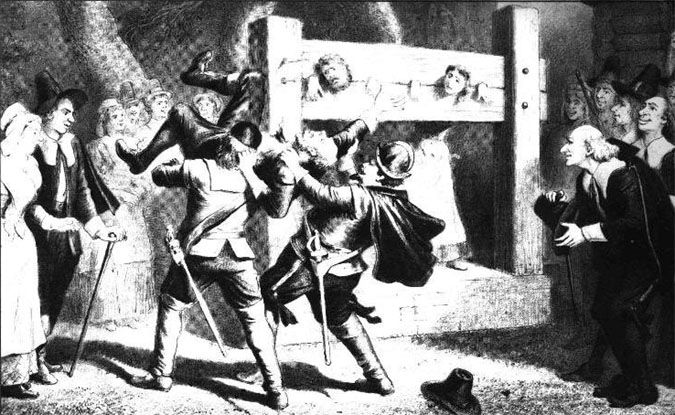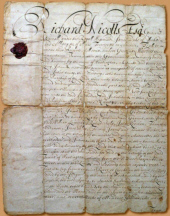Porter Family Genealogy
|
The Porter surname was first found in Hampshire, where Hugh de Port was listed in the Domesday Book as a major land holder.
Our family line can be traced back to SAMUEL PORTER (1567 - 1660) of Dorchester, Devonshire, England. Samuel apparently sailed to the United States as part of the great Puritan emigration. He married a woman named SARAH (1568 - 1599) and they had a son, JONATHAN PORTER (1602 - 1665) who married a woman named EUNICE.
Jonathan is recorded as a church member on 05 Apr 1640 in Salem, Essex County, Massachusetts, and on the second of June in 1641, Jonathan took the oath as a free man. He and Eunice had at least three daughters: Elizabeth Porter (1620 - 1670), Eunice Porter (1621 - 1661), and our ancestor, MARY PORTER (1625 - 1661).
CHILDREN OF JONATHAN AND EUNICE PORTER |
At
the time, Salem was a great area for a child to be educated. The Puritan work
ethic was the belief that hard work was an honor to God, which would lead to a
prosperous reward. No less was expected of kids, and for the first time in history,
free schooling was offered for all children. Knowledge of Scripture and divinity,
for the Puritans, was essential. Puritan leaders did not bolster the knowledge
of its ministry simply to perpetuate the level of power of the ruling elite. A
continuing goal was to further education among the laity, and so ensure that not
only were the right and righteous ideas and understandings being held and expressed,
but that the expressions were in fact messages received by a comprehending audience.
An Act passed in Massachusetts in 1647 required "that every town of one hundred
families or more should provide free common and grammar school instruction."
So unlike most of the branches in our family at this point in time, the Porters
were probably educated.Puritans formed the first formal school in 1635, called
the Roxbury Latin School. Children aged 6-8 attended a "Dame school"
where the teacher, who was usually a widow, taught reading. "Ciphering"
(math) and writing were low on the academic agenda. In 1639, the first American
College was established; Harvard in Cambridge, supported by poor yeoman farmers,
who "contributed their pecks of wheat" for the continued promise of
a "literate ministry." (So it's kind of sad that only the children of
millionaires can enter the school today.)
Along with the
schools, literature flourished, as well. In 1638, the first printing press arrived.
By 1700, Boston became the second largest publishing center of the English Empire.
The Puritans were the first to write books for children, and to discuss the difficulties
in communicating with them. At a time when other Americans were physically blazing
trails through the forests, the Puritans efforts in areas of study were advancing
our country intellectually.
Great pains were taken to warn
their members and especially their children of the dangers of the world. The education
of the next generation was important to further "purify" the church
and perfect social living.
But there was a downside to Puritanism,
too: It wasn't any fun! Three English diversions were banned in their New England
colonies; drama, religious music and erotic poetry. The first and last of these
led to immorality. Music in worship created a "dreamy" state which was
not conducive in listening to God. Since the people were not spending their time
idly indulged in trivialities, they were left with two godly diversions.
Reading
of the Bible was necessary to living a pious life. It stimulated their corporate
intellect by promoting discussions of literature. Greek classics of Cicero, Virgil,
Terence and Ovid were taught, as well as poetry and Latin verse. They were encouraged
to create their own poetry, always religious in content.
Any
deviations from the normal way of Puritan life met with strict disapproval and
discipline. Since the church elders were also political leaders, any church infraction
was also a social one. There was no margin for error -- and this proved to be
the Puritans' downfall.

The
devil was behind every evil deed. Constant watch needed to be kept in order to
stay away from his clutches. Words of hell fire and brimstone flowed from the
mouths of eloquent ministers as they warned of the persuasiveness of the devil's
power. The sermons of Jonathan Edwards, a Puritan minister, show that delivery
of these sermons became an art form. They were elegant, well formed, exegetical
renditions of scriptures... with a healthy dose of fear woven throughout the fabric
of the literary construction. Grammar children were quizzed on the material at
school and at home. This constant subjection of the probability of an unseen danger
led to one of the most infamous and tragic scandals in American history, and coined
the phrase, "witch hunt."
In 1688, four young girls
in Salem accused a laundry woman of "bewitching" them. What could have
been stopped progressed into a community tragedy. The young women enjoyed the
attention this story afforded them, but no doubt were afraid that their lies would
be found out. In an effort to further punctuate their story, they lapsed into
prolonged convulsions.
In order to understand what happened
next, you need to know that at this point in history, the belief in witches was
generally questioned by no one -- Puritan or otherwise -- "and even as late
as the close of the seventeenth century hardly a scientist of repute in England
but accepted certain phenomena as due to witchcraft." Cotton Mather, one
of the Puritan leaders, wrote Memorable Providences, Relating to Witchcrafts
and Possessions (1689), which only made matters worse. This would prove the
fire for the Salem Village witch trials, and the people became the tinder. Those
who were accused of being "possessed by the devil" were forced to make
confessions of their evil liaisons in order to protect their families and properties
from harm (then killed). Those who denounced witchcraft (thereby calling the witnesses
liars) were then accused themselves. By 1690, two hundred persons were in jail,
fifty in prison and twenty executed (along with 2 dogs). 19 men and women were
hanged to death on Gallows Hill, four died in prison, and one defiant man, Giles
Corey, was pressed to death beneath a board and stones in a torturous attempt
to obtain a confession.
Fortunately, our ancestors had left
the area by then -- and not by their own choice: When the Quaker religion spread
to Massachusetts in the early 1650s, Jonathan Porter became a member -- and as
a result he was fined and run out of town by the Puritans.
The Porter left Salem for Huntington, Suffolk County, New York, in 1658 in the company of the Harnett, Chichester and Jarvis families, all Quaker adherents. An accurate date for their move to Huntington, Long Island can be established by a meeting held in Salem on the 31st of August in 1658, where "Edward Harnet, Taylor [tailor], beeinge now about to remove out of the town," apprentices Jeremiah, son of Alice Chichester.
All
four families are closely associated in early Long Island records, and all three
of Jonathan and Eunice Porter's daughters married within that small group; Elizabeth
married Edward Harnett, Jr., Eunice married James Chichester, and our ancestor,
MARY, who wed STEPHEN JARVIS (1625 - 05 Aug 1693), who
was born in England, possibly Stafford County, and sailed to America on the ship
"Primrose." He arrived in Salem in1656. He and Mary were wed in Salem,
but moved along with Jonathan and Eunice Porter to New York. Jonathan conveyed
his estate at Salem to James Chichester, his son-in-law (by way of daughter Eunice),
on the condition that he care for his widow, should she outlive him.
CHILDREN OF STEPHEN JARVIS AND MARY PORTER |
 |
Their daughter and our ancestor, EUNICE JARVIS, married JOSEPH WOOD on the 15th of December in 1681. They had JOSEPH WOOD, JR., in Hempstead around that time. Joseph Jr. married MARGRIET (MARGARET) WOOD, from Jamaica, Long Island, Queens County, New York, at the close of the 1600's.
Joseph Jr. and Margriet had JONATHAN WOOD, in Hempstead. Jonathan married JOHANNA CROMPTON and moved to Rockland County, New York, and had MARTHA WOOD, who met and married WILLIAM HAUSE.
GENEALOGY SAMUEL PORTER (1567 - 1660) married SARAH (1568 - 1599) and begat... JONATHAN PORTER (1602 - 1665), who married EUNICE (1610 - 1670) and begat... MARY PORTER (1625 - 1693), who married STEPHEN JARVIS (1625 - 05 Aug 1693) and begat... EUNICE JARVIS, who married JOSEPH WOOD in 1680 and begat... JOSEPH WOOD, JR. (1680 - ?) who married MARGRIET (MARGARET) WOOD and begat... JONATHAN WOOD (1720 - ?) who married JOHANNA CROMPTON (1725 - ?) and begat... MARTHA WOOD (1753 - 1822) who married WILLIAM HAUSE (1750 - 1818) and begat... JOHN HAUSE (1773 - 1844) who married ESTHER KETCHAM (1779 - 1853) and begat... AUGUSTUS HAUSE (1804 - 1875) who married JANE JONES (1802 - 1850) and begat... LABAN HAUSE (1831 - 1906) who married MELISSA SANDERSON (1839 - 1921) and begat... FRANK HAUSE (1867 - 1951) who married FLADELLA RAYMOND (1869 - 1961) and begat... CARLISLE HAUSE (1891 - 1972) who married MARJORIE MARCHANT (1892 - 1939) who begat... CARLETON MARCHANT HAUSE, SR. (1917 - 1983) who married JEANNE BRUNNER (1918 - 2000) and begat... CARLETON MARCHANT HAUSE, JR. (b. 1939) who married MARTHA WENK (b. 1940) and begat... JEFF (who married LORI ANN DOTSON), KATHY (who married HAL LARSEN), ERIC (who married MARY MOONSAMMY), and MICHELE HAUSE (who married JOHN SCOTT HOUSTON). |
Literature
on the Porter Family:
William Dodge, John Porter and Mr. Edmond Batter were appointed administrators of the estate of Samuel Porter, November Term, 1659 [EQC 2:192].
Publication: Genealogical Publishing Co, Baltimore MD, 1985
Publication: Genealogy.com
Page: p233, The First Settlers of New England, Surnames O-P
Page: p431, Guide to the Early Settlers of America, Surnames O-P
Page: p452, History of New England 1630-1649, Vol. II, Appendix
.gif)